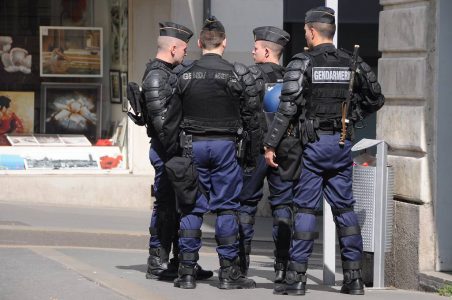
Release of the first French jihadist who joined the Islamic State raises security concerns
The recent release from prison of a Frenchman who joined ISIS in Syria in 2012 is raising concern in France, especially after a knife attack in London on Sunday prompted British Prime Minister Boris Johnson to voice support for stopping the early release of convicted terrorists.
The attack in Britain came days after the knifeman, Sudesh Amman, was freed early from prison, after a 2018 conviction for disseminating terrorist material.
Frenchman Flavien Moreau, who was freed in mid-January, joined the Sunni terrorist group to fight against the Assad regime. His release prompted right wing politicians to call for longer detention periods for jihadists and radicalized individuals. Some have even suggested that the most dangerous people should remain incarcerated indefinitely.
Of 550 prisoners, 70 of them women, convicted of acts of terrorism, jihad or related offenses, around 40 are expected to finish their sentences in 2020. Moreau is the first.
In 2021, 107 prisoners serving terror-related sentences are due for release, while 147 are set for release in 2022, Justice Minister Nicole Belloubet said in a television interview last week.
Also of concern for many here is the possible repatriation of French jihadists being held by Kurdish forces in Syria.
Moreau returned from Syria in 2013, was convicted of the “association of criminals for the preparation of an act of terrorism,” and sentenced to seven years’ imprisonment.
“His past story does not reassure, but he has served his sentence and there is no way to keep him, in one way or another, in jail,”, said Jean-Charles Brisard, president of the Center for Analysis of Terrorism.
As Moreau is still considered dangerous, he will be subject to judicial surveillance for just over 11 months. He can be summoned at any time by a judge. He cannot travel outside a designated area of France, or abroad.
His name is now on the national judicial register of perpetrators of terrorist offenses, who continue to be monitored by intelligence services for as long as deemed necessary.
In a radio interview last year, Belloubet said freed jihadists would be subjected to “extremely strict follow-up.”
“When we are faced with this kind of detainee, the authorities conduct an assessment of their dangerousness and they are put in a sealed area in jails,” she said. “When they leave, there is obviously an extremely strict follow-up by the territorial intelligence services.”
Under a 2012 law, the French justice systems is empowered to judge terrorist acts committed abroad by French citizens. A public prosecutor may initiate proceedings, but practical problems arise, including the assessment of evidence of acts committed abroad.
Didier Rebut, professor of Criminal Law and Procedure at Sorbonne University, told FranceTVInfo that the main danger remains a risk of acquittal.
“We can condemn them for all the offenses qualified as terrorists by the penal code – attacks, destruction, murders, kidnappings – but we must have proof.”
“Because it encompasses many cases, the offense jihadists are often charged with in France is the association of criminals in connection with a terrorist enterprise. This charge is generally accepted because it is the easiest crime to prove,” Rebut said.
The offense Moreau was charged with enables a conviction of a person who has expressed support for a group with a terrorist purpose without necessarily having him or herself committed any terrorist act.
It has been widely used against jihadists who returned voluntarily from the ISIS region. The charge makes it possible to secure heavy sentences, in a simpler and quicker trial than would otherwise be the case.
In a common criminal case, a detainee must be brought in front of a judge and formally charged within 24 hours. In a terror-related case, the period may be extended to 72 hours (or even 96 or 144 hours in some cases).
Some critics worry about the fact that when it comes to terrorism cases, standard procedures relating to pre-trial detention, the adjustment of sentences, and other issues, do not apply.
In a newly-published book Marie Dosé, a lawyer who defends people and their relatives who left or tried to leave France for Iraq or Syria to join ISIS’s “caliphate,” denounced the emergence of what she called an exceptional system of justice, applied in the case of terror suspects since a wave of attacks in France in 2015 and 2016.
By applying that legal regime indiscriminately to all those who wanted to leave, or left the country to join radical groups, France ends up producing the opposite of an effective criminal policy, and in fact “feeds terrorism,” Dosé said.
Source: CNS News





